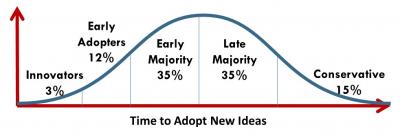Firing people is always a last resort.
Firing people should always be a last resort, not an instrument of culture change.
If you rely on firings to a achieve change, sure you will get there faster but a lot of those you keep will never forgive you. You generate cultural debt. Humans are animals, we have lizard brains. We need safety and security to be productive. You will never get good work out of people in a state of fear. And you will never get loyalty out of people when you have already exhibited your lack of loyalty to some of their colleagues. Firing people is a blunt instrument, violence which traumatises those who remain. Its not a positive cultural tool. You better be sure that everybody you want to stay agrees with the firing decision.
How often are those people genuinely malevolent, and how often are they actually acting with good intentions?
Even the malevolent ones, what makes them like that?
Stop making it about the individuals. Fix the system. The majority come around, people blossom once you get the work system off their back.
If you must treat people as "human resources", then don't waste the resource: skills, talent, relationships, training investment, institutional knowledge, familiarity with systems. All of these are assets that it costs money to replace. Not to mention the cost of recruitment, and the cost of delay finding people. Hiring people is a crap shoot anyway: you have no way of knowing you will be better off until after a few months.
Bring people along, get the system off their back, let them blossom. If you're firing more than a few difficult people, you're a failure as a manager and leader. The need to fire someone is more often sign of bad management than it is a sign of a bad person.
[actually I'm falling into the same trap: blaming the people. Managers are as trapped in the system as anyone else. Change the system to allow managers to manage better.]
It's not binary. Stop seeing people as good/bad, keep/fire. Nobody is perfect, nobody is normal, nobody fits your ideal. People have a diversity of views and abilities. People change over time, especially if you as a manager are actually doing something to allow and encourage them to change. A good manager works with the cards they are dealt. They work with the people they have; they find the best use of their particular nature and attributes, they find the right mix.
People can and do change their behaviors—they simply need to be “ripe” to do so. That is, the right conditions and psychological factors need to be in place for them to be open and willing to change.
If people don't suddenly agree with you overnight and grasp the new way due to your sheer brilliance, that's your problem not theirs. Work harder.
The human rate of change is measured in years. I'm ten years into this stuff and still grasp new concepts regularly. The velocity of humans imagining Nirvana is higher than velocity building that Nirvana. Your concept gets there right away but the real world not so much. Patience! Humans are distributed on the normal distribution curve

Embrace the diversity of your people. We like conservatives: they provide an essential brake on irrational exuberance.
The nice thing about being a horse, a legacy organisation, is that you have areas that won't change much for years, where you can "park" the more careful people to give them time to absorb new ideas. If you're going to change faster than your people, then you are going to accrue cultural debt, just like the technical debt you are also generating. You'll pay.
If firing is one of your change tools, grow up. You can be better. Treat people like fellow humans, leave the psychopathy for senior executives.


 Made in New Zealand
Made in New Zealand 
